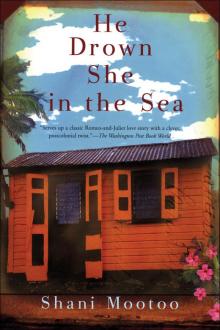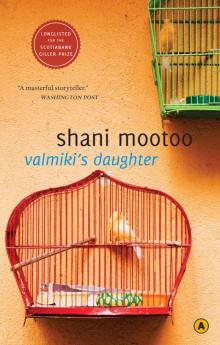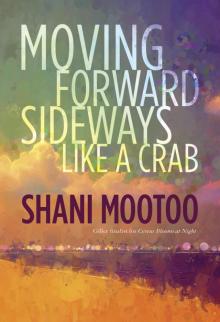- Home
- Shani Mootoo
Moving Forward Sideways Like a Crab Page 7
Moving Forward Sideways Like a Crab Read online
Page 7
We were all, I thought, counting on the probability that, simply by living in a big North American city, we would be greeted as warriors on our arrival back home by those who knew us and those who didn’t alike. Greeted as champions. I was a champ for giving up the perks of living with family, among friends whose families had known mine for generations, among people familiar to me from primary school days. I lived now without the deep comfort of neighbours who cooked more food than they needed for themselves so that they could parcel it up and bring you some. I had left behind strangers who, passing on the street, bid each other good day, and people who put off their own chores to lend you a hand. I had given up all of this in the hope that I would no longer have to live a lie, that I could, at last, come into my authentic self. So on this particular occasion I had dressed as I always did, to announce my individuality and assert that I had indeed found authenticity. No one here needed to know the truth or to question whether such authenticity was achievable. But, deep inside, I had a sudden burst of clarity as my thoughts turned to Zain: I understood that on my previous visits to Trinidad I had hoped that Mum, Dad, Gita, Jaan, and even Zain would admire me precisely because I had become yet a little more unrecognizable, a little more mysterious to them—but the price I paid for that illusion of mystery was steep.
At last Dad arrived, pulling his burgundy Jaguar carefully into a parking spot. The car had barely come to a stop before the trunk opened automatically, revealing an empty, immaculately clean, royal-blue carpeted area. Dad stepped out slowly and walked around the car to the sidewalk. Daylight had arrived in earnest by this time, the sky as blue as it would be, the glare strong.
With a lit cigarette between the fingers of his right hand, my father lightly gripped my shoulders, pulled me to him and patted my back. The greeting was over in a second. He dropped the cigarette on the asphalt, stepped on it and twisted his foot. The soles of his gleaming patent-leather shoes were thin, the warm weather here and the dependence on cars not warranting thick-soled protection. My father’s performance with his cigarette was deliberate, a sort of preparation to lift my suitcase into the trunk.
“It’s okay, Dad, I will get it,” I said. “It’s heavy.”
I reached for the handle but he was firm. “No, no. Don’t be silly.”
In my peripheral vision I could see waiting passengers, taxi drivers and porters watching. My gesture, I surmised, had likely insulted my father. I backed away. My father gripped the suitcase handle, heaved upwards, but then struggled with the final lift into the trunk. I reached under and lent a hand up. Once the luggage was in, he shoved and shoved to move it to the far end of the trunk. Without looking at me, he mustered all the congeniality his pursed lips would permit.
“Well, we hadn’t expected you’d be returning so soon.”
Our drive home ought to have taken an hour but instead took more than twice that long. We were often at a standstill on the highway, sometimes going a full fifteen minutes without a single car budging an inch on the southbound lanes. I suggested turning off the engine, and realized I sounded exactly as I had hoped I wouldn’t: almost immediately upon arriving I was imposing my North American–acquired righteousness regarding environmental issues. Dad countered that the heat off the asphalt and the exhaust from the cars in the lineup would be too unpleasant. After a while we noticed that the only cars coming through on the northbound side of the highway were police vehicles. Something major, we assumed, had stopped traffic both ways. Life will carry on, I thought, with both resignation and the sense of being cheated, and there will be events that will overtake and overshadow what has befallen Zain.
My father declared, as if it were his idea entirely, “I think this will put a strain on the air conditioning. I’m going to turn off the engine. We can turn down the windows, just for a few minutes. You don’t mind, do you?” The question was rhetorical—he had already engaged the controls. Drivers and passengers, all men, had come out of their cars, strangers standing between the two lanes of cars pointing south, their chatter drifting through the open window, expressing resignation about being late for this or that, some lamenting they had left home so early especially to beat traffic, that they had not even had breakfast yet. Heat, like a curtain, blew into the car and with it the sting of exhaust, woodsmoke and spices from the curry powder factory located nearby. No birds could be heard but three corbeaux circled wide and slow high overhead. I wanted to ask if Zain’s murderer had been found, but at the same time couldn’t bring myself to mention her name just yet. Instead I suggested listening to the radio for possible news about what could be causing such a major jam. From station to station there was only music—Indian music, calypso, American pop music, advertisements. My father and I made uneasy small talk.
Finally, I could wait no longer and asked what had been on my mind. “So, any more news about what happened to Zain?”
He simply shook his head in resignation, and I tried again. “Has anyone been caught?”
“We’re living in a barbaric society, Siddhani. There is no respect for life here anymore. The government doesn’t respect the people, so they don’t respect themselves or anyone else. The police haven’t made a single arrest in any of the last dozen or so robberies, all of which have ended with at least one murder. Do you know how many murders we have had this year so far? It is June, and there have been 245. Just under 40 murders a month. More than one a day. This country has gone to hell.”
I persisted, bringing the conversation back to Zain. “Do we know what was stolen from the house? I mean, was anything actually taken?”
My father looked at me directly for the first time since I had arrived. “Well, the news reports are still calling it a home invasion. I don’t really understand what that means. We haven’t heard that anything was stolen. I don’t know what this country is coming to. It’s so odd that nothing was taken. Nothing material, I mean. One can’t help but wonder if Angus is involved in something shady and this was some sort of revenge, payback, you know, that sort of thing. It is surprising who is rumoured to be involved in high-level crime in this country. You hear about judges, the police, government ministers and certainly businessmen. We meet these people at cocktail parties, and the way they carry on—you know they must be involved in something. After all, the economy hasn’t been so good in Trinidad for years now. No one can legally make the kind of money to have the lifestyles these people have.”
“I know Angus, Dad. Angus isn’t involved in anything. He’s not that kind of man, at all. I phoned and tried to speak with him, but he didn’t say much; he was just crying. He said he didn’t even know how the kids were doing. They were all numb.”
My father turned practical. “Your mother sent flowers to Zain’s parents and to Angus and the children. I’ve arranged for Tank to take you to the funeral. He’ll wait for you, for as long as you want. I’ve told him that while you’re here he’ll be at your disposal. I think Gita might be coming over tonight. Yes, your mother mentioned that, actually.”
The jam on the highway continued. I thought about turning the window down to ask the driver beside our car what he saw from his vantage point, but felt I should ask first if this was all right to do. My father said at once, “Good idea. Let me ask him.” He leaned across me to call through my window. The driver, a balding man with a moustache and wearing a sleeveless mesh vest, was already looking at us, as if he had anticipated the interaction.
He smiled and said, “Dr. Mahale, I say to myself is your car self. You going good, boss?”
My father smiled in return. “How are you, man? A hell of a thing, this traffic, eh?”
I knew from his tone that he hadn’t recognized the man. Our neighbour said that as far as he could see, nothing was moving, and that the lanes on the other side were clear.
When the man turned away, I asked Dad if he knew him, and indignation and pride were bound up in his one-word answer, “No!” He leaned down discreetly and looked at the writing on the side of the truck. It said,
in green letters, Ramdeen Transport. “I know of the company, you see their trucks all over, but I don’t know this man personally. In any case, he is probably just a driver.”
He turned the engine on so that the air conditioning would cool the car. A minute later he turned it off again. He did this several times.
Suddenly, a wave of annoyance washed over me, and just short of snapping, I said, “I don’t understand how you can stand this sort of thing, Dad. Why do you all put up with such inconvenience and so much slackness? It’s probably an accident due to speeding or another murder. Somebody’s been killed, probably. But that’s just par for the course here, it seems.”
“It’s unbelievable, isn’t it,” my father calmly agreed.
“Yes, but how can you put up with it? Nothing changes in this place.”
“Things are improving, Siddhani. Things do change, but slowly. It’s harder on people like you who go away and see how things are done elsewhere. I’m sure it’s all relative, though. You must have the sense over there that change comes slowly too. Don’t you?”
I realized that what I really wanted was to talk more—more openly, more directly—about Zain’s murder. But I couldn’t. It was easier this way.
“I don’t understand why you stay,” I said. “How come you and Mom don’t leave?”
“We’re too old for that now. That sort of move doesn’t make sense at our age. All our friends are here, my golfing friends, your mother’s family connections, which mean everything to her. We’d have to make friends all over if we went somewhere new, and at our age that won’t be easy. The weather too. You know, I can’t stand the cold. That’s why we haven’t left. You know what I always think about when I imagine living abroad? Slipping on ice in front of my own house. Having to shovel snow and scrape ice myself. And, yes, slipping. From what I hear, people do things for themselves over there. I can’t imagine cleaning my car myself, or even my golf clubs and shoes after a game.”
“But why didn’t you leave years ago, when you were younger?”
“Oh, Sid, it’s not that easy. I am ‘somebody’ here. Everybody knows me. People know who we are. With my connections I get things done overnight, not only for us, but also for other people. I don’t think I would have had that kind of clout in Canada or the States. Life is easier for us here than it would have been even in England. If we’d wanted to go to the States or to Canada I’d have had to take my medical exams all over again, to start over to build a practice. I suppose I could have done something entirely different, but we’re living the life we’ve always known. Can you imagine me behind a counter in a convenience store? I’d rather die. Or live here.” He chuckled, then continued more seriously, “You know, it does bother your mother and me that you can’t live in Canada the way you can here. No one over there, I am sure, knows who you are, whose child you are. We still wish you’d come home and settle back down here. Life would be easier here for you. Don’t you think so? It’s not too late, you know. If you wanted to return I would make a few calls and you’d have a choice of jobs in no time.”
I opened my mouth to reply, but at just that moment, people began getting into their cars, and the thrum of engines started up. I knew there was no use in responding.
We started off slowly, and as cars began to stream past on the other side as if a bridge over a causeway had been let down or the guard at a rail crossing cleared, the traffic in our lane picked up speed and carried on without a hitch all the way down the highway. We saw not a single thing that could have warranted such a halt.
Dad used his controls to turn up our windows and he switched on the air conditioner. I allowed myself to sink into the seat and into sleep. It was only as we arrived at the turnoff from the main road that would take us into the residential area where my family had lived since I was seven years old that my father said softly, “Sid, we’re here.”
I came reluctantly out of sleep, wanting to stay in the place I had gone to, where I had just said to Zain, “Look at the crabs,” and she had answered, “That’s you, Sid, that’s just how you move.” I had heard her correctly, but I responded lightly, “Did you say stealthy, like a cat?”
“No, you fool,” she said. “Sideways. Sideways, like a crab.”
I teased her: “Oh, you have to talk louder. The waves and the wind. I can’t hear you.”
As I woke, she was chiding and teasing, “You have to clean your ears. I can’t talk any louder. You want me to lose my voice or what? You move like a crab, is what I said. But learn to walk like me. Like a cat. One foot in front of the other.”
The sunlight, the stunning silver of the sea ahead, jolted me into the day, and I caught my breath. We were at the very spot where, as children, my sister and I would be awakened from the sleep we’d fallen into on the long return drive from Port of Spain or the beaches at Mayaro or Maracas. Again, despite my recent visit, I felt as if I were seeing everything for the first time. The old jacaranda tree in the Atkins’ yard was in full bloom. The De Francos’ tall white undulating fence, their rambling concrete house, disappearing and reappearing through a forest of landscaping, was not as shamelessly imposing as I’d always thought, but suddenly as reassuring as a cup of fragrant morning tea. The street off to the side, just before the De Franco house, made me remember—as it always did—poor little Johnny Maingot. I was eight when Johnny tore off his left-hand ring finger. It was his fifth birthday and he was wearing the ring his parents had given him as a present. At the party he tried to scale the chain-link fence around his family’s house. He fell, but the ring caught on a loose piece of wire. His father rushed him to our house, imagining that Dad could reattach the finger right there in the home surgery. I hadn’t seen the accident but, oh, so many years later, I still have a picture in my mind of every detail, even the finger tearing off on the fence, as if I had observed it all. I had wondered at the time if, because it was his left-hand ring finger, this meant that he was no longer marriageable. As it turned out, Johnny got a girl pregnant when he and she were in their last year of high school. They married and he took a job as an insurance salesman in one of his parents’ friend’s businesses. I knew this because my mother kept me up-to-date on news about everyone.
Just ahead was the Gulf, its water an uninviting grey-brown. The sky was clear all the way across. It was one of those days when one could see from my parents’ property the faint blue of the northern arm of the island where Angus and the children were, and where Zain used to be. I turned my window down halfway and felt the breezes, heard the bird sounds and dogs barking.
The metal rollers of the automated ten-foot-high sliding gate grated along their track. Musa and Bunny, the two family dogs, came running down the side of the house.
The back door was unlocked, and Joan, who had worked for my family for several years, came out. She hugged me in such a way that I knew she was telling me she was sorry about Zain. I nodded in greeting to Bhoodoosingh, our yardman. He mumbled back, “Mornin’, Miss. You come back already. I sorry to hear about your friend.” Bhoodoosingh brought in my bag, leaving it just inside the door to my bedroom.
Now Mum came briskly towards me, her hair groomed and makeup fresh. She offered a warmer hug than I had received from Dad.
She gave an unsure half-smile, biting one corner of her lower lip as she said, “Are you all right? How was the flight?”
Her look held so much that was unspoken, and it made me want to cry. Seeing this, she quickly said, “Come, let’s go and eat. Joan made breakfast for you.”
Mum, Dad and I headed down to the breakfast table. Dad kept a notepad and ballpoint pen on a butler’s cart that was parked behind his chair. He took up the pad and, putting on his glasses, read quietly. Then he set it down next to his plate and alternated taking in mouthfuls of food with listing his day’s tasks. After a while, he looked up and asked Mum about her supply of pills. Mum replied that she had enough to last the week. He took off his glasses and looked at me. What were my plans for the day? he asked. I said I
had no plans. I was tired. I might take a nap. My father mentioned that he’d had the pool cleaned yesterday for me. It was lovely out there and I should go in today before it was dirtied with ash from farmers illegally burning cane. And did I need Tank right away for anything?
I thanked him and repeated my desire to stay close to home. My father put down his knife and fork and stood up. He patted Mum on her head, squeezed my shoulder and left for the day.
Mum called Joan, and the two of them began discussing what was in the fridge that needed to be used up and what was to be bought in the grocery and in the market that day. I sat in the kitchen for some moments, listening to their voices against the purring of the large fan that kept the area cool.
Then I rose and went to my old, familiar room and lay on my bed—Musa and Bunny having taken up their usual positions at the foot of it. Cool air pumped noisily from the outdated air-conditioning unit. The room’s concrete walls had been painted recently. Drawn curtains over the windows, which were protected by wrought-iron grilles on the outside, kept out the heat of the mid-day sun and darkened the room. I switched on the ceiling light. It shone through a thick square shade of frosted glass on which were etched in fine gold lines Snow White, Cinderella and a fairy godmother, all united by waves of silver-painted ribbons. This had been my bedroom since I was ten years old. I thought: I am in the country of my birth, in the neighbourhood and house I have known since I was a child, in my own bedroom. My mother is outside, and the gardener I have known since I was a teenager is in the yard. This is my home.
Still, I felt more alone than ever. More alone than I had felt in Canada where I had no relatives, where I travelled the same streets daily and yet hardly ever crossed paths with people I knew, where I lived in rooms that stored no childhood memories. Which was my real life? I wondered. The one in Trinidad, where we had the same neighbours for more than forty years, where I knew people who could tell me what I was like as a child, where a stranger at the mall would stop me and chat because I looked so much like my mother or father, or identical to my grandmother? Or was my real life the one I lived in Canada, where there was no one to be compared with, or to disappoint?

 Cereus Blooms at Night
Cereus Blooms at Night Polar Vortex
Polar Vortex He Drown She in the Sea
He Drown She in the Sea Valmiki's Daughter
Valmiki's Daughter Moving Forward Sideways Like a Crab
Moving Forward Sideways Like a Crab